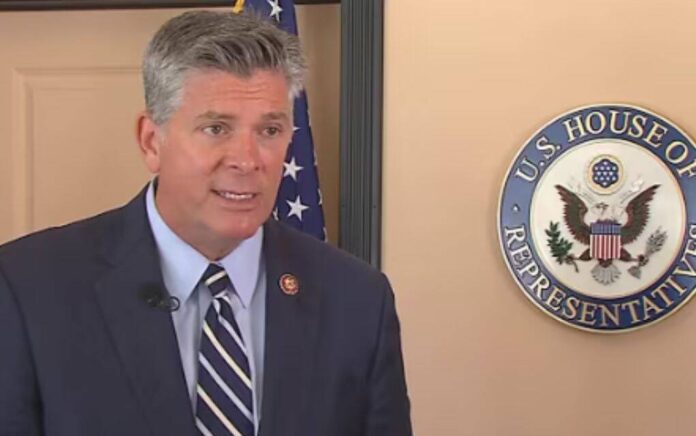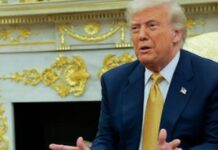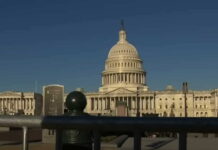
The U.S. is being put on red alert. The next several months will decide America’s future.
Because the Trump admin and the U.S. House has uncovered a foreign enemy’s plan to completely overthrow the United States.
China’s Quiet Plans to Surpass America
Rep. Darin LaHood, a Republican from Illinois, recently sounded an alarm about China’s long-term strategy to overtake the United States. On the “John Solomon Reports” podcast, he laid out a sobering assessment of Beijing’s goals. “China has a plan to replace the United States, and they’re working at it every single day,” LaHood said. “I don’t say that to scare people. That’s the reality. They want to beat us technologically, militarily, economically and diplomatically. And the sooner we wake up to that, the better.” His words point to a growing concern in Washington: China’s methodical pursuit of global dominance.
The U.S.-China relationship has grown increasingly tense in recent years, with disputes spanning trade, technology, and national security. From tariffs to tech bans, the two nations have clashed over issues that shape the global order. LaHood’s comments come at a time when American policymakers are grappling with how to counter China’s advances while protecting U.S. interests. The stakes are high, as Beijing’s actions suggest a deliberate effort to challenge America’s leadership on multiple fronts.
A startling example of this challenge surfaced recently when Just the News reported that Chinese scientists were indicted for smuggling a potentially dangerous fungus into the U.S. In one instance, they succeeded by concealing the contraband in a pair of boots. Such incidents raise questions about the security of American borders and the lengths to which some will go to undermine U.S. interests. The episode serves as a reminder of the vigilance required to safeguard the nation against covert threats.
In West Virginia, GOP Governor Patrick Morrisey has taken a firm stand against Chinese influence. He recently urged the state’s investment management board to sever financial ties with China, a move that deals a setback to Beijing’s economic reach. Morrisey’s decision is a part of a new push in the U.S. to reduce dependence on Chinese markets and counter Beijing’s aggressive maneuvers. His actions highlight the growing recognition that economic entanglement with China carries risks that America can ill afford.
LaHood, a member of the House Select Committee on China and the House Permanent Select Committee on Intelligence, emphasized the urgency of addressing these risks. “We have to make sure that we are protecting this country appropriately, but also, it’s equally important in making sure we win the strategic competition against China when it comes to AI, when it comes to quantum [and] when it comes to high-capacity chip manufacturing,” he said.
To tackle one aspect of this competition, LaHood introduced bipartisan legislation called the Chip Security Act. The bill aims to prevent the smuggling of American-made advanced chips into China, where they could be used to bolster Beijing’s technological capabilities. Evidence has emerged that U.S. chips were funneled through shell companies to support the development of Chinese AI software, including by DeepSeek, a Hangzhou-based artificial intelligence company. “There’s evidence now that’s come out that DeepSeek was successful in terms of their rollout,” LaHood said. “Because of these chips, we’re going to require location verification for advanced AI chips.”
The Chip Security Act responds to a growing concern that American innovation is being exploited by China’s ruling Communist Party (CCP). “This, again, is another wake-up call,” LaHood said. “We anticipate this bill will get a vote later this year, and I don’t see any reason why it shouldn’t become law.” The legislation represents a practical step toward safeguarding U.S. technology and maintaining a competitive edge in the global race for technological supremacy.
LaHood’s concerns about AI are particularly pointed. “AI is one of the most high-stakes fronts in our strategic competition with the Chinese Communist Party,” he said in a statement last month. The CCP’s history of leveraging U.S. capital and intellectual property to advance its own technology is well-documented. By targeting the smuggling of chips, the Chip Security Act seeks to close a loophole that could allow American technology to fuel China’s ambitions.
DeepSeek’s role in this saga is a real challenge. The company’s success in developing AI software, allegedly with the aid of smuggled U.S. chips, illustrates China’s determination to close the technological gap with America. LaHood’s legislation aims to ensure that U.S. innovations do not inadvertently empower Beijing’s efforts to dominate critical industries. His approach balances pragmatism with a clear-eyed view of the threat posed by China’s technological advancements.
The U.S. has long been a beacon of innovation, driving progress in fields from computing to artificial intelligence. Yet, as LaHood’s warnings suggest, that leadership is not guaranteed. China’s relentless pursuit of technological, military, economic, and diplomatic superiority demands a response that is both strategic and resolute. The Chip Security Act is one piece of that response, aimed at protecting the fruits of American ingenuity from exploitation.
LaHood’s bipartisan effort also speaks to a rare unity in Washington. The recognition that China’s actions pose a serious challenge transcends party lines, as lawmakers from both sides of the aisle rally to protect U.S. interests. “I am proud to join my colleagues and introduce the Chip Security Act to protect American innovation and prevent our foremost adversary from smuggling American-made chips,” LaHood said. “Under no circumstances can the United States allow our technology to power CCP propaganda machines, like DeepSeek.”
The Federalist Wire will bring you any major updates from the U.S. House of Representatives.



















